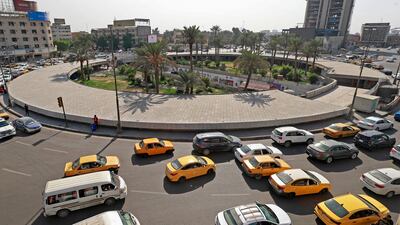The head of Iraq's Commission of Integrity, the country's official anti-corruption body, submitted his resignation on Sunday as a wave of scandals rock the country.
Prime Minister Mohammed Shia Al Sudani quickly accepted the resignation and picked judge Haider Hanoon Zayer as his replacement.
Judge Alaa Al Saadi didn’t give the reasons for his decision to step down, but alluded to pressure from political parties.
“Giving up this post is a relief to the one in charge and an emancipation from the heavy and perilous responsibilities that cause problems with different parties inside the executive authority or the blocs which support their members inside the legislative authority,” Mr Al Saadi said.
He said that he faced a smear campaign from “media arms linked to the influential parties that have sought to manipulate public opinion against all serious efforts to fight corruption and to protect public funds”.
The latest development came as authorities investigate a number of major corruption scandals involving the theft of billions of dollars.
Last month, a former minister revealed that 3.7 trillion Iraqi dinars (almost $2.5 billion) was embezzled from the tax authority in what is being described locally as “the theft of the century”.
A few weeks later, the National Security Service announced the arrest of a criminal network that siphoned crude oil from pipelines in remote areas of southern Iraq and smuggled it out of the county. Senior interior ministry and intelligence officers were allegedly involved.
Mr Al Sudani, who took over late last month, has said corruption is the main threat to the country.
“Corruption is a serious threat to the Iraqi state, more dangerous than all other threats that have weighed on Iraq”, he said in a press conference early this month.
He vowed to tackle the problem. “The citizens want to feel that there is a sense of responsibility and that looted money is returned,” he said.
Speaking at the annual Middle East Research Institute Forum in Erbil last month, the UN Special Representative for Iraq Jeanine Hennis-Plasschaert described the corruption as “pervasive, structural and systemic”.
Ms Hennis-Plasschaert blamed the informal power-sharing arrangement — called Muhasasa in Arabic — that was established after the overthrow of dictator Saddam Hussein in the 2003 US-led invasion.
Under the arrangement, which has been the basis for all subsequent Iraqi governments, Shiites are entitled to 12 ministries, Sunnis six, Kurds four and the rest distributed among other religious and ethnic groups, regardless of election results.
“That arrangement turned into a quite closed community, a community of collusion and a community of corruption protection,” Ms Hennis-Plasschaert said.
Mr Al Saadi is not the first to resign from his post due to pressure from political parties.
In August, Ali Allawi resigned as finance minister in protest against what he called widespread corruption and the influence of political parties over the country’s revenue.
Iraq is considered one of the most corrupt countries in the world, ranking 157 out of 180 in Transparency International's corruption perceptions index.
Widespread corruption has crippled the country’s efforts to recover from decades of war and UN-imposed economic sanctions, eating into ministry funds that are desperately needed for vital services such as electricity and water.


